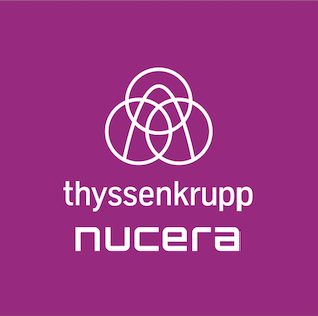thyssenkrupp nucera and Fraunhofer IKTS Agree on a Strategic Partnership in SOEC Technology
|
thyssenkrupp nucera and Fraunhofer IKTS Agree on a Strategic Partnership in SOEC Technology
Arnstadt/Dortmund, March 13, 2024 – thyssenkrupp nucera is positioning itself even better for the electrolysis market of the future. In order to further expand its position as a leading global supplier of electrolysis technologies for the production of green hydrogen, the company is strengthening its technology portfolio with the highly innovative high-temperature electrolysis (SOEC) of the Fraunhofer Institute for Ceramic Technologies and Systems IKTS. thyssenkrupp nucera and the Fraunhofer IKTS are entering into a strategic partnership for this purpose. The research institute has been carrying out extensive research and development work in SOEC (Solid Oxide Electrolyzer Cell) technology for over 20 years and has done the necessary preliminary work with a view to industrializing this electrolysis technology. Together, thyssenkrupp nucera and Fraunhofer IKTS want to work to take the final steps in high-temperature electrolysis (SOEC) toward industrial manufacturing and application. As early as the first quarter of 2025, a pilot plant planned and built by Fraunhofer IKTS is scheduled to start operation for the production of high-temperature electrolysis stacks with SOE cells – the core elements of the SOEC stacks – initially in small quantities. The strategic partnership also includes a license for the production and use of CFY stacks based on the SOEC technology of Fraunhofer IKTS by thyssenkrupp nucera. The SOEC stack technology is based on a gas-tight oxygen-ion-conducting ceramic electrolyte with screen-printed electrodes and pressed interconnectors made of a chromium-based alloy (CFY). The electrolyte-supported cells, the choice of materials used and the design ensure high efficiency, long-term stability, robustness and cost-effective mass production. The further industrialization of SOEC technology will be based on the results of the research and development activities. "With SOEC system solutions, we are consistently implementing our company's growth strategy. With high-temperature electrolysis, we will offer our customers an extremely powerful technology that will be another strong pillar of the new, CO2-free and therefore climate-friendly energy mix of the future without fossil fuels," says Dr. Werner Ponikwar, CEO of thyssenkrupp nucera. "Through the strategic partnership with Fraunhofer IKTS, we are strengthening our hydrogen product portfolio with a second high-performance technology for industrial scale in addition to AWE technology." Professor Dr. Alexander Michaelis, Director of Fraunhofer IKTS, adds: "We are very pleased to contribute our world-leading research and development expertise in SOEC technology to the partnership with thyssenkrupp nucera. In addition to the higher efficiency in electricity-to-hydrogen conversion, high-temperature electrolysis also offers the great advantage that CO2 can be actively extracted from the environment and converted together with green hydrogen into green synthesis gas and downstream products such as e-fuels. This is a key success factor for the energy transition. By upscaling CFY stack production, we are giving our system partners commercial access to this core component." The high energy efficiency of SOEC technology will primarily benefit industries in which industrial waste heat is generated during production, as its use significantly reduces electricity consumption. Waste heat is generated in the production of green steel, ammonia, methanol, fertilizers and energy storage, among other things. In addition, the use of high-temperature technology eliminates the need for rare precious metals. "SOEC technology perfectly complements our technology portfolio," says Dr. Christoph Noeres, Head of Green Hydrogen at thyssenkrupp nucera. "For our future SOEC system solutions, we can build on our decades of experience in the development and scaling of electrolysis plants, as we have already proven with the successful development of our 20 MW AWE module scalum®."
For inquiries regarding photos, please send an email for further details and assistance.
Investor inquiries: thyssenkrupp nucera Dr. Hendrik Finger
About Fraunhofer IKTS: The Fraunhofer Institute for Ceramic Technologies and Systems IKTS develops advanced high-performance ceramic materials, industrial manufacturing processes as well as prototype components and systems in complete production lines up to the pilot-plant scale. In addition, the research portfolio also includes materials diagnostics and testing. Our motivation is to develop sustainable and economical system solutions for energy transition, resource efficiency and digitalization. In the field of high-temperature electrolysis, Fraunhofer IKTS has developed various stack designs, constructed them as prototypes and tested them for their suitability for different applications and load profiles, including techno-economic evaluations. With currently around 800 employees at 13 sites, Fraunhofer IKTS represent Europe‘s largest R&D institute dedicated to the study of ceramics.
About thyssenkrupp nucera: thyssenkrupp nucera offers world-leading technologies for high-efficiency electrolysis plants. The company has extensive in-depth knowledge in the engineering, procurement, and construction of electrochemical plants and a strong track record of more than 600 projects with a total rating of over 10 gigawatts already successfully installed. With its water electrolysis technology to produce green hydrogen, the company offers an innovative solution on an industrial scale for green value chains and an industry fueled by clean energy – a major step towards a climate-neutrality. thyssenkrupp nucera successfully made an IPO in July and is a member of the SDAX of the Frankfurt Stock Exchange since September. End of Media Release Issuer: thyssenkrupp nucera AG & Co. KGaA Key word(s): Enterprise
13.03.2024 CET/CEST Dissemination of a Press Release, transmitted by EQS News - a service of EQS Group AG. |
| Language: | English |
| Company: | thyssenkrupp nucera AG & Co. KGaA |
| Voßkuhle 38 | |
| 44141 Dortmund | |
| Germany | |
| Phone: | +49 231-22972-7100 |
| E-mail: | info@thyssenkrupp-nucera.com |
| Internet: | www.thyssenkrupp-nucera.com |
| ISIN: | DE000NCA0001 |
| WKN: | NCA000 |
| Indices: | SDAX |
| Listed: | Regulated Market in Frankfurt (Prime Standard); Regulated Unofficial Market in Berlin, Dusseldorf, Hamburg, Hanover, Munich, Stuttgart, Tradegate Exchange |
| EQS News ID: | 1857287 |
| End of News | EQS Media |
|
|
1857287 13.03.2024 CET/CEST

